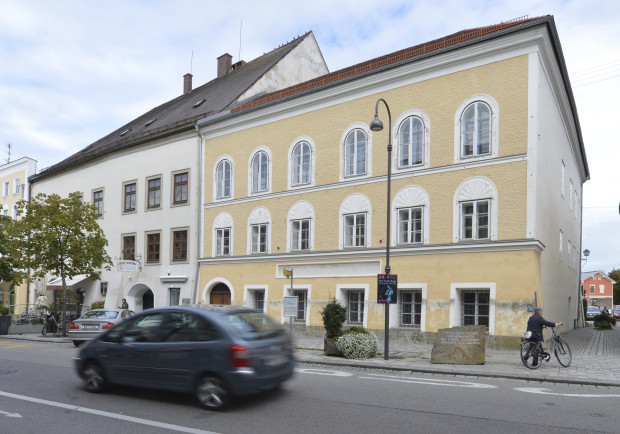
This Sept. 27, 2012, file picture shows an exterior view of Adolf Hitler’s birth house, front, in Braunau am Inn, Austria. Austria’s government said on Monday, Oct. 17, 2016 that it planned to tear down the house where Hitler was born and replace it with a new building. AP
VIENNA, Austria — The house in Austria where Adolf Hitler was born is to be torn down to stop it from becoming a neo-Nazi shrine, the government said Monday, after years of bitter legal wrangling with the current owner.
“The Hitler house will be torn down. The foundations can remain but a new building will be erected. It will be used by either a charity or the local authorities,” Interior Minister Wolfgang Sobotka told Austrian newspaper Die Presse.
The government hopes this will bring to an end a difficult chapter regarding the large yellow corner house where Hitler was born on April 20, 1889.
“In any case, there shall be no further connection with Adolf Hitler because otherwise the myth of the birth house will be upheld.”
He said the decision was based on the recommendations of a 13-member expert committee tasked with deciding what to do with the controversial building in the quaint northern town of Braunau am Inn.
The government hopes this will bring to an end a difficult chapter regarding the large yellow corner house where Hitler was born on April 20, 1889.
Although he only spent the first few weeks of his life at Number 15 Salzburger Vorstadt Street, the address has become a pilgrimage site for Nazi sympathisers from around the world who pose in front of the three-storey building with the Hitler salute.
Stigma ‘not deserved’
The property has been empty since 2011 when the government became embroiled in a dispute with owner and local resident Gerlinde Pommer.
Her family has owned the 800-square-meter (8,600-feet) building for more than a century, except for a brief period during the Nazi regime when Hitler’s private secretary Martin Bormann bought the building for four times its value in 1938.
After the war, the house was returned to the Pommers in the 1950s.
In 1972, the Austrian government signed a lease with Gerlinde Pommer in 1972 and turned the premises into a center for people with disabilities.
A number of cultural organizations previously opposed the building’s demolition because it is part of the historic city center and therefore under heritage protection.
But the arrangement came to an abrupt end five years ago when Pommer unexpectedly refused to grant permission for much-needed renovation works.
The famously elusive owner also rejected a purchase offer made by the increasingly exasperated interior ministry.
In July, the government approved a legislation amendment to seize the house from Pommer who continues to net 4,800 euros (around $5,300) in rent every month.
The interior ministry said Monday that the expropriation bill would be debated in parliament this week and could enter into force by the end of the year.
“There is now a clear perspective regarding the future of the building under the ownership of the Austrian republic,” ministry spokesman Karl-Heinz Grundboeck told AFP.
But locals resent the attention, dismayed that their pastel-coloured town is known for being the cradle of one of the world’s most reviled political figures, rather than for its Gothic architecture or pretty river.
The issue has sparked heated debate among Braunau’s 17,000 residents. Some wanted it to become a refugee center, others a museum dedicated to Austria’s liberation from Nazi rule.
A number of cultural organizations previously opposed the building’s demolition because it is part of the historic city center and therefore under heritage protection.
Every year on Hitler’s birthday, anti-fascist protesters organize a rally outside the building at 15 Salzburger Vorstadt Street, next to a memorial stone reading: “For Peace, Freedom and Democracy. Never Again Fascism, Millions of Dead Warn.”
But locals resent the attention, dismayed that their pastel-coloured town is known for being the cradle of one of the world’s most reviled political figures, rather than for its Gothic architecture or pretty river.
“The people here don’t deserve this stigma,” district commissioner Georg Wojak told AFP in an interview last year. “Braunau’s only crime was that Hitler was born here.” CBB